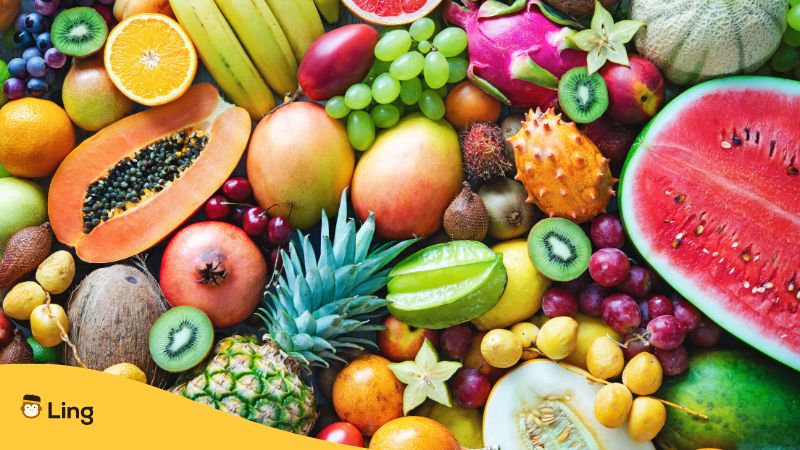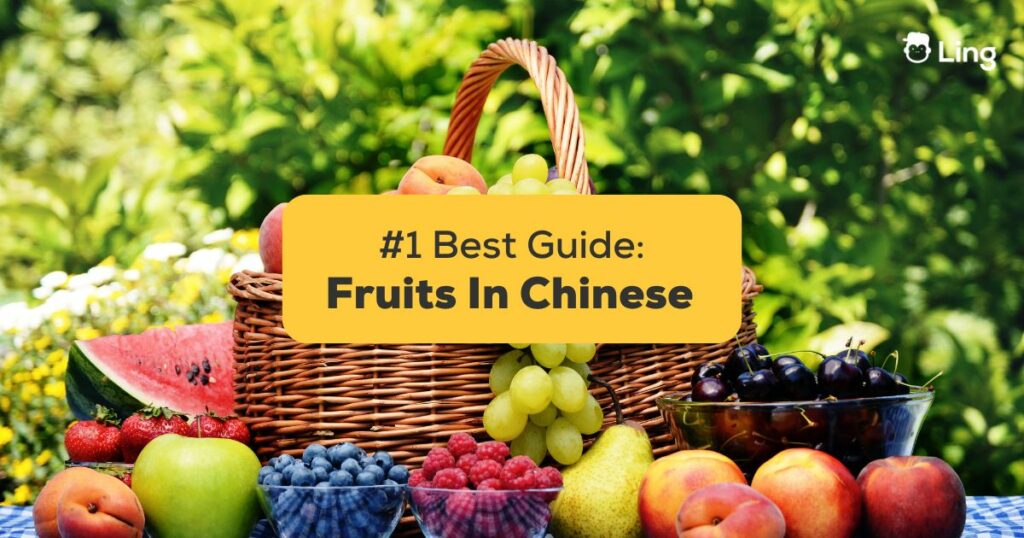Feeling like a fish out of water when it comes to the delicious world of exotic fruits and their intriguing names? In this guide, we’ll go over the easiest terminologies for fruits in Chinese so you can easily buy some when you visit any Chinese-speaking countries.
Imagine swaggering up to any roadside fruit stand or fancy restaurant in China like you own the place. Instead of playing a sweaty game of charades, you’ll drop those fruit names with the casual confidence of a local. “两个火龙果和一个荔枝,朋友!” (Two dragon fruit and a lychee, my friend!)
The vendor’s eyes will widen as they realize this isn’t your first rodeo. You’ve cracked the code on the quirky lingo for all those crazy tropical delights. While others flounder with phrasebooks, you’ll be plucking durian and rambutan off the cart like it’s nothing.
Fruit Culture In China
Okay, let’s talk Chinese fruit culture for a sec. These babies aren’t just eye candy – they’re like little edible symbols packed with centuries of tradition, superstition, and lore. Take the humble mandarin orange, for instance. Come Lunar New Year, these sunshine spheres are like prosperity personified! Their sunny hue screams “wealth” louder than a Macau casino, and the fact that “ju” sounds just like “luck” in Mandarin? Talk about an auspicious double-whammy.
But if longevity is more your jam, you gotta pay respects to the mighty peach. We’re talking a fruit so ancient, it was cultivated back when the pyramids were just tiny square plots. In Chinese folklore, these fuzzy wonders are nothing short of mythical fountain-of-youth material. One bite and you might unlock immortality – or at least outlive that annoying neighbor blasting Chinese opera at 6 AM.
From edible lucky charms to life-extending snacks, Chinese fruit symbolism is a whole flavor-packed world unto itself. Who knew these juicy gems were so much more than Vitamin C bombs?

Common Recipes In China Featuring Fruits
Hear me out – Chinese cuisine isn’t just some flash in the wok. These lip-smacking fruit-filled recipes are the real stars, weaving their juicy, sweet, and tangy magic into beloved national treasures. We’re talking next-level flavor combos that’ll flip your taste perception on its head.
Take tangerine peel tea, for instance. Who would’ve thought steeping those vibrant rinds would brew up a downright addictive citrusy elixir? One piping hot sip, and you’ll be pounding that fragrant goodness like it’s liquid zen.
Or how about stewed snow pears luxuriating in a delicate rock sugar syrup bath? Spoon one of those melt-in-your-mouth hunks into your mouth and try not to have an existential crisis over the pure, natural sweetness.
Feeling a little under the weather? Hell, just whip up a batch of that fruity, throat-coating pear water magic. Between the simmered rock sugar and vitamin C boost, you’ll be breathing easy and kicking that cold’s butt in no time.
But let’s not forget the real showstopper – Chinese fruit salad. I’m talking a full-on kaleidoscope of tropical flavors like mango and kiwi playing nice with the classic strawberry and banana. Tossed up with some almond extract and warm five-spice powder? That’s a collision of East-meets-West that’ll blow your mind AND your tastebuds.
Last, but definitely not least, we’ve got to pay our respects to the humble but mighty jujube. These chewy, nutrient-packed Chinese dates aren’t just a festive snack – they straight up symbolize prosperity and good fortune. So you better believe I’ll be stuffing my face with them around the New Year while mumbling “gong xi fa cai” through sticky smiles.
Look, all I’m saying is the Chinese don’t play around when it comes to fruit-forward cooking. These tantalizing recipes effortlessly weave those juicy gems into downright iconic dishes bursting with flavor, fragrance, and straight-up magic. One bite and your tastebuds will be the real believers.
Berries In Chinese
These bite-sized bursts of flavor and antioxidants may have names that twist your tongue, but trust me, it’s worth the linguistic gymnastics. Sure, at first, these names might feel like tongue-twisters designed to test your linguistic limits. But with a little practice (and perhaps a few amusing mispronunciations), you’ll be rolling those syllables off your tongue like a seasoned Chinese chef slicing through a plump, juicy strawberry.
| English | Chinese Script | Pronunciation |
|---|---|---|
| Strawberry | 草莓 | Cǎoméi |
| Raspberry | 树莓 | Shùméi |
| Blueberry | 蓝莓 | Lánméi |
| Blackberry | 黑莓 | Hēiméi |
| Cranberry | 蔓越莓 | Mànyuèméi |
| Gooseberry | 醋栗 | Cùlì |
| Elderberry | 接骨木莓 | Jiēgǔmù méi |
| Boysenberry | 波森莓 | Bōsēnméi |
| Mulberry | 桑葚 | Sāngrèn |
| Acai Berry | 巴西莓 | Bāxī méi |
| Lingonberry | 越橘 | Yuèjú |
| Cloudberry | 云莓 | Yúnméi |
Citrus In Chinese
On the surface, those vibrantly hued orbs of sunshine look utterly harmless. They beckon with their zesty aromas and promise of sweet-tart refreshment. But oh buddy, those clever Chinese have mind-pretzeled things up with their intricate characters and tongue-tangling names. Don’t believe me? Read on!
| English | Chinese Script | Pronunciation |
|---|---|---|
| Orange | 橙子 | Chéngzi |
| Lemon | 柠檬 | Níngméng |
| Lime | 青柠 | Qīngníng |
| Grapefruit | 葡萄柚 | Pútáoyòu |
| Mandarin | 桔子 | Júzi |
| Tangerine | 橘 | Jú |
| Clementine | 克莱门橘 | Kèláimén jú |
| Pomelo | 柚子 | Yòuzi |
| Bergamot | 佛手柑 | Fóshǒugān |
| Yuzu | 柚子 | Yòuzi |
| Blood Orange | 血橙 | Xuèchéng |
| Kumquat | 金桔 | Jīnjú |
Other Fruits In Chinese
Ready to expand your language skills further? Here are some of the translations for the most common fruits in Chinese.
| English | Chinese Script | Pronunciation |
|---|---|---|
| Apple | 苹果 | Píngguǒ |
| Banana | 香蕉 | Xiāngjiāo |
| Pear | 梨 | Lí |
| Mango | 芒果 | Mángguǒ |
| Peach | 桃子 | Táozi |
| Pineapple | 菠萝 | Bōluó |
| Watermelon | 西瓜 | Xīguā |
| Cherry | 樱桃 | Yīngtáo |
| Papaya | 木瓜 | Mùguā |
| Kiwi | 猕猴桃 | Míhóutáo |
| Avocado | 鳄梨 | Èlí |
| Pomegranate | 石榴 | Shíliú |
| Fig | 无花果 | Wúhuāguǒ |
| Coconut | 椰子 | Yēzi |
| Plum | 李子 | Lǐzi |
| Guava | 芭乐 | Bālè |
| Lychee | 荔枝 | Lìzhī |
| Durian | 榴莲 | Liúlián |
| Starfruit | 杨桃 | Yángtáo |
| Persimmon | 柿子 | Shìzi |
| Dragon Fruit | 火龙果 | Huǒlóngguǒ |
Learn Chinese With Ling
Whoa, who knew exploring Chinese fruits could be such a flavor-packed adventure? If you’re sold on becoming a fruit vocabulary master (and really, how could you not be?), then the Ling app is your golden ticket. The expert-based lessons will guide you through this ripe, radiant world, letting you soak up symbolism and linguistic flair like a thirsty sponge.
So whatcha waiting for? Grab Ling, start mastering fruit names like a boss, and get ready to infuse every conversation with bursts of cultural zest. After all, who doesn’t want to be the life of the mooncake party?


































































